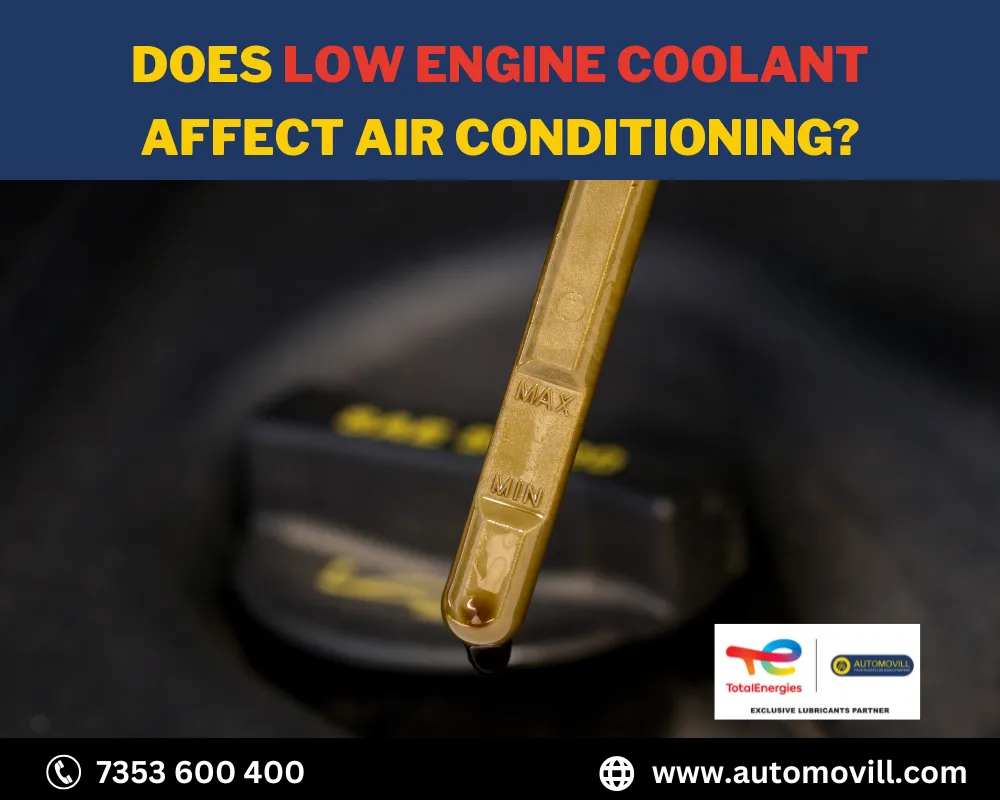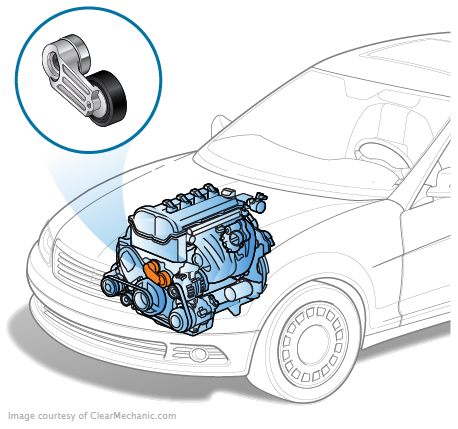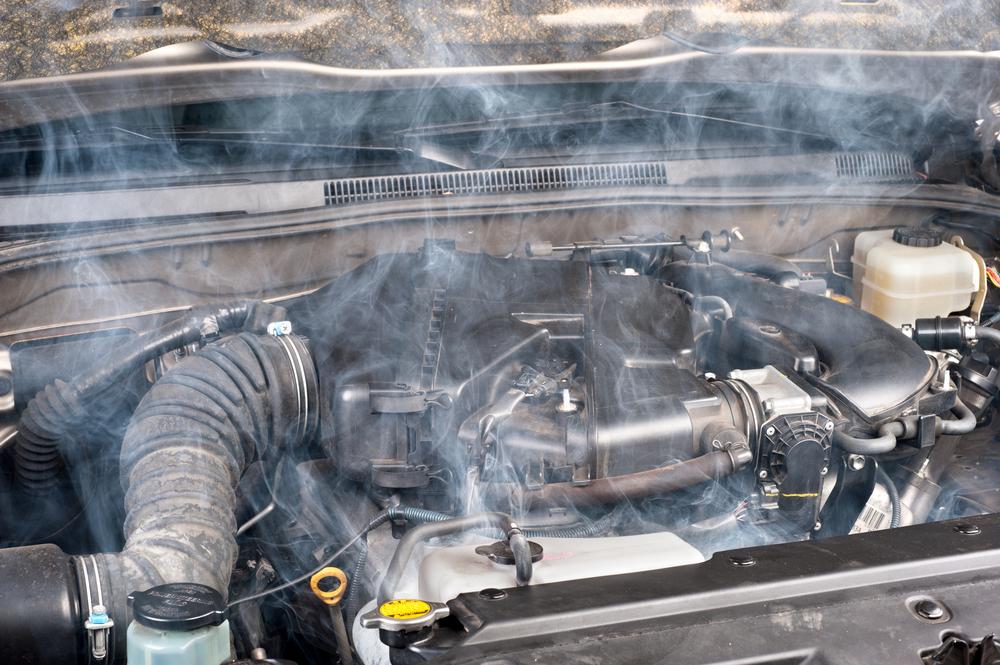Can Low Coolant Affect Air Conditioning
Low coolant can indirectly affect air conditioning performance. It often leads to engine overheating, which may then reduce the AC’s effectiveness.
Maintaining the proper coolant level in your vehicle is crucial for engine health and its auxiliary systems, including air conditioning. Coolant, or antifreeze, is primarily responsible for heat transfer and preventing engine overheating. Yet, the relationship between coolant and air conditioning is not direct.
The air conditioning system relies on refrigerant, not coolant, to cool the vehicle’s interior, but if the engine runs hot due to low coolant, the air conditioner may shut off or perform less efficiently to prevent further strain on the engine. Thus, while coolant is not used in the AC system itself, it’s vital for overall vehicle temperature regulation, including the conditions under which the air conditioning operates. Regular checks of coolant levels and system integrity keep your engine and AC running optimally, especially during warmer months when cooling systems are under increased stress.

Credit: kh.linkedin.com
Link Between Coolant Levels And Air Conditioning
Understanding how your car cools itself is crucial, especially during hot summer days. The engine’s coolant plays a big part in this. Some might wonder if this coolant also affects the air conditioning system. It’s time to explore that link.
The Role Of Coolant In Vehicle Performance
In every car, the coolant works hard every day. It flows through the engine. It takes heat away to keep the engine from overheating. It’s like a super-hero for your car’s engine!
- Circulates through engine blocks
- Transports heat to the radiator
- Radiator cools it down
Impact Of Low Coolant On Thermal Regulation
Low coolant levels spell trouble. Think of it as not having enough water on a hot day. Your body gets too warm. Your car feels the same way. Without enough coolant, the engine can’t stay cool.
- Engine temps rise dangerously
- AC system overworks to compensate
- Possible engine damage without proper cooling
Symptoms Of Low Coolant Affecting Ac Performance
Your vehicle’s air conditioning (AC) system is crucial for comfort during those hot summer months. But did you know that low coolant levels can directly impact your AC’s performance? Let’s delve into the symptoms that indicate your AC might be suffering due to low coolant.
Inconsistent Cabin Temperatures
If you notice that the temperature inside your car seems to fluctuate without reason, it might be a sign of low coolant levels. Proper coolant levels are essential for consistent AC performance. Here are some telltale signs of inconsistency:
- Variable airflow from AC vents
- Warm air instead of cool
- Sudden temperature spikes
Overheating Engine Complications
A car’s engine and AC system are closely connected. Low coolant can cause your engine to overheat, which has a domino effect on AC performance. You might observe the following issues:
- Increased engine temperature gauge readings
- Smoke or steam emerging from under the hood
- A distinct hot engine smell
Remember, prompt attention to these symptoms can prevent further damage.
Mechanics Of Air Conditioning In Vehicles
Imagine a hot summer day and your car’s air conditioning is your best friend. But did you know that something called ‘coolant’ is key to keeping you cool? Let’s unlock the secrets of how air conditioning in vehicles works. You’ll understand why it matters to keep an eye on your coolant level!
Your car’s air conditioning is like a cold-producing wizard. It uses a special substance to transfer heat from inside to outside. This substance is called refrigerant. The AC system has different parts that play together:
- Compressor: Squeezes the refrigerant and pushes it through the system.
- Condenser: Lets the hot refrigerant release its heat to the air outside.
- Expansion valve: Cools down the refrigerant even more by reducing pressure.
- Evaporator: Lets the refrigerant absorb heat from the car, making the air cool.
Now, what about the coolant? Coolant doesn’t cool the air directly. It keeps the engine happy. Without enough coolant, the engine might overheat. A hot engine can make it tough for the AC system to do its job. The cooler the engine, the better the air conditioning works. Keeping your coolant level right helps keep you chilled on those hot days!
| Coolant Function | Benefit for AC |
| Prevents engine overheating | Optimizes AC performance |
| Helps maintain temperature | Ensures consistent cooling |
Credit: www.quora.com
Diagnosing Ac Issues Related To Coolant
A car’s air conditioning (AC) system and coolant levels are crucial for comfort and performance. Yet, many drivers wonder how these two systems interact. Understanding the connection helps diagnose problems when the AC isn’t working right. Specifically, low coolant levels can indirectly affect your car’s air conditioning. Let’s investigate the signs that indicate a coolant deficiency and explore the professional diagnostic procedures available.
Signs Of Coolant Deficiency
Low coolant can lead to overheating, which may cause the AC system to underperform. Look out for these signals:
- Temperature gauge spike: A sudden move towards ‘hot’ could be a clue.
- Heater malfunction: Inconsistent heating might indicate coolant issues.
- Engine warning light: This can sometimes signal low coolant.
- Weird smells or smoke: Sweet-smelling vapor or smoke could point to a leak.
Professional Diagnostic Procedures
A trained mechanic can pinpoint AC issues tied to coolant with these steps:
- Check coolant levels: They start by verifying the coolant is not low.
- Pressure testing: This reveals leaks in the cooling system.
- Thermal imaging: Detects hot spots caused by coolant loss.
- AC performance test: Assesses whether the car’s AC produces cold air.
Note: Skipping timely coolant checks and AC maintenance can affect vehicle health. Always seek professional assistance to ensure your comfort and safety on the road.
Solving Air Conditioning Problems Caused By Low Coolant
Your car’s air conditioning (AC) system relies on a symphony of parts working in unison. One unsung hero in this chilly concerto is the coolant. It might seem surprising, but low coolant levels can indeed affect your AC’s performance. A well-maintained cooling system ensures your car stays cool even on the hottest days. Below are steps to rectify AC issues stemming from low coolant levels.
Replenishing Coolant Levels
To restore your AC to its maximum efficiency, check and replenish your vehicle’s coolant.
- Locate the coolant reservoir under the hood.
- Check the min and max markers to assess levels.
- If low, add the appropriate type of coolant.
Remember to allow your engine to cool down before attempting to remove the coolant reservoir cap to avoid potential injury from hot steam.
Preventing Future Coolant Loss
Prevention is key to keeping your AC in top shape. Protect against future coolant loss with these tips:
| Prevention Method | Benefits |
|---|---|
| Regular Inspections | Catch leaks and issues early on |
| Using Quality Coolant | Extend the life of your cooling system |
| Proper Radiator Cap Seal | Prevent coolant evaporation and leaks |
Adhering to a maintenance schedule and promptly addressing cooling system repairs are crucial for AC efficacy and longevity.

Credit: www.autotechiq.com
Frequently Asked Questions For Can Low Coolant Affect Air Conditioning
Can Low Coolant Lead To Ac Problems?
Yes, low coolant can lead to air conditioning troubles in your vehicle. The coolant helps maintain proper temperatures in the engine that can affect the AC system’s efficiency. If the engine runs hot, it can indirectly impair the AC’s performance.
How Does Coolant Affect Car Ac Efficiency?
Coolant doesn’t directly impact the AC but is essential for the engine’s overall thermal management. A well-cooled engine allows the AC system to function optimally by preventing excess heat from impacting the air conditioning components and airflow.
Is Ac Performance Tied To Coolant Levels?
Indirectly, yes. Lower coolant levels can cause the engine to overheat, resulting in the air conditioning system working harder to cool the vehicle. This added strain can reduce the AC’s performance and its ability to cool the air effectively.
Can I Check Coolant Levels At Home?
Absolutely. Checking coolant levels involves inspecting the coolant reservoir, typically a transparent container near the radiator. Ensure your engine is cool before you remove the cap to check the level against the marked indicators.
Conclusion
Understanding the connection between your car’s coolant levels and air conditioning performance is crucial. Low coolant can indirectly impact the AC, leading to discomfort, especially during warm weather. Regular checks are essential for a reliable and efficient system. So, remember to monitor your coolant to keep cool on your drives.







